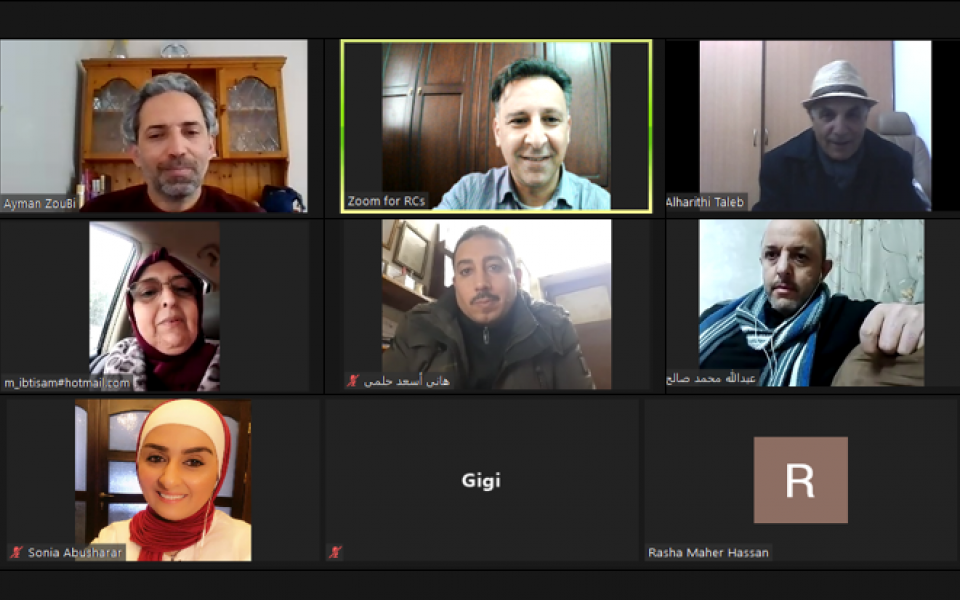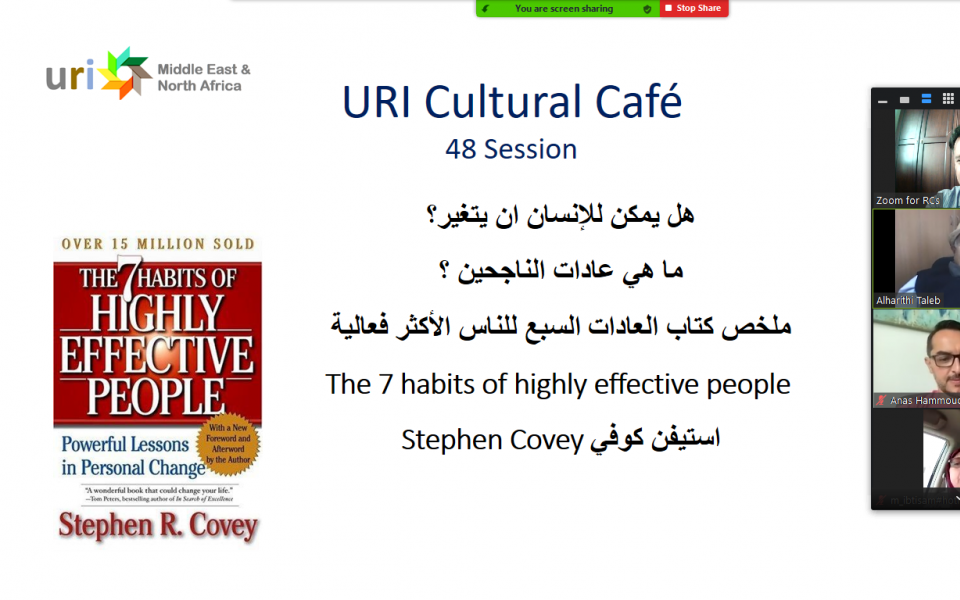
URI MENA Cultural Café – Session 48
On 27 March 2021, the URI MENA Cultural Café was held. This session covered the "7 Habits of Highly Effective People" and was facilitated by the URI MENA Regional Coordinator, Mamoun Ahmad.
We discussed how people could change themselves. Then we tackled the habits of highly effective people, as presented by Stephen R. Covey in his self-improvement book "7 Habits of Highly Effective People."
The following seven habits were explained and discussed:
- Be Proactive.
- Begin with the End in Mind.
- Put First Things First (manage priorities).
- Think Win-Win.
- Seek First to Understand, Then to Be Understood.
- Synergize.
- Sharpen the Saw.
In addition, participants enriched the session by sharing their Personal Mission Statements.

Major takeaways:
You can change yourself and others through five possibilities: (1) when we change convictions; e.g. beliefs, principles, ethics, thinking, ambitions; (2) when we change interests; (3) when we change competencies; (4) when we change relationships; and (5) when we change role models.
It is all about our own perceptions. The way we see the world is entirely based on our own perceptions. In order to change, we must change ourselves, and in order to change ourselves, we must be able to change our perceptions.
Success is a function of personality, public image, attitudes, and behaviors.
As we grow up and become more mature, we understand the importance of teamwork, collaboration, and communication skills, and moving from independence to interdependence.
Proactive people recognize that they have responsibility "response-ability" (the ability to choose how they will respond to a given situation). Reactive people take a passive stance; they believe the world is happening to them.
To be proactive, we must focus on our "Circle of Influence/ Control" that lies within our "Circle of Concern," we must work on the things we can do something about. This gives us positive energy and may expand our Circle of Influence. Reactive people, on the other hand, focus on things that are in their Circle of Concern but not in their Circle of Influence. This leads to blaming external factors out of their control, such as Marco Economy, COVID 19 pandemic...etc., emanating negative energy, and causing their Circle of Influence to shrink.
Our self-awareness empowers us to shape our own lives, instead of living our lives based on the standards or preferences of others.
We need to have a longer-term vision of what we will achieve in the long run from the things we do in our lives today.
It is good to be a principle-centered person; identifying the timeless, unchanging principles by which you must live your life. This will give you the guidance that you need to align your behaviors with your beliefs and values.
One should prioritize his/her day-to-day actions based on what is most important, not what is most urgent.
It is recommended that everyone create his/her own time management matrix to start prioritizing.
To establish effective interdependent relationships, we must commit to creating Win-Win situations that are mutually beneficial and satisfying to each party. If you can't reach an agreement that is mutually beneficial, there is no deal.
We need to maintain an Abundance Mentality, or the belief that there's plenty out there for everyone.
Most people with the Scarcity Mentality (people seeing life as a finite pie, so that if one person takes a big piece, that leaves less for everyone else) tend not to share recognition or credit and find it difficult to be genuinely happy about other people's successes.
With Win-Lose, or Lose-Win, one person gets what he wants for the moment, but it will negatively affect the relationship between those two people going forward.
Win-Win, is not only about being nice, it is about being courageous.
To achieve Win-Win, keep the focus on results, not methods; on problems, not people.
We must seek to deeply understand people and their perspective, before we expect them to understand us, through empathic listening. We should not prescribe a solution before we diagnose the problem.
Synergy allows us to create new alternatives and open new possibilities.
Synergy is valuing the differences between people.
To be effective, we must devote the time to renewing ourselves physically, spiritually, mentally, and socially. Continuous renewal allows us to increase our ability to practice the habits of highly effective people.
